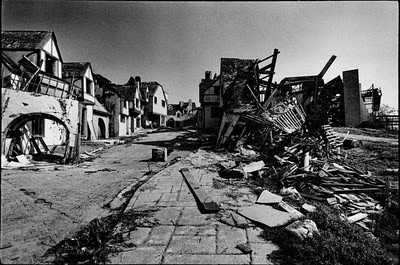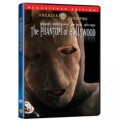| Reviews & Columns |
|
Reviews DVD TV on DVD Blu-ray 4K UHD International DVDs In Theaters Reviews by Studio Video Games Features Collector Series DVDs Easter Egg Database Interviews DVD Talk Radio Feature Articles Columns Anime Talk DVD Savant Horror DVDs The M.O.D. Squad Art House HD Talk Silent DVD
|
DVD Talk Forum |
|
|
| Resources |
|
DVD Price Search Customer Service #'s RCE Info Links |
|
Columns
|
|
|
Phantom of Hollywood, The
It helps that The Phantom of Hollywood is also an exceptionally good TV-movie, one of the best of its kind during the Golden Age for such things. Duel (1971) and The Night Stalker (1972) were made not long before this and may have inspired its production. The Phantom of Hollywood is itself a strange transitional piece. A montage of film clips seen at one point in the story appears to have been lifted from the television documentary Hollywood: The Dream Factory (1972), a show that in turn led to That's Entertainment! (1974), the popular celebration of MGM's rich history released a few months after The Phantom of Hollywood aired, and which featured former MGM stars standing in front of many of the same rotting backlot streets. A Warner Archive Collection release, The Phantom of Hollywood gets a great, full-frame transfer just in time for Halloween.
The head of Worldwide Films, Roger Cross (Peter Lawford), makes arrangements to sell off the studio's Lot 2, including its expansive backlot. "We need the cash," he argues, not unsympathetically, noting that during his reign as studio chief the backlot has been used but twice. The land might just as well be sold and converted into a supermarket or condominiums, he says. Editor Jonathan (Jackie Coogan), press agent Ray Burns (Peter Haskell), and Cross's daughter, Randy (Skye Aubrey, the real-life daughter of James T. Aubrey - MGM's president at the time) watch television coverage of a public auction of Worldwide Films props and costumes, including Dorothy's ruby slippers from The Wizard of Oz. Jonathan finds it too depressing and switches the TV off.
Meanwhile, police detectives O'Neal (Broderick Crawford) and Gifford (John Ireland) are investigating the deaths of two hippie trespassers. It looks like an accident, but in fact they were murdered by a mysterious masked phantom, long-rumored to be living on the lot, dressed as a medieval executioner and flailing a ball-and-chain. Later, at a party, the Phantom is revealed to be Karl Vonner (Jack Cassidy), the John Barrymore-esque brother of still-photo archivist Otto Vonner (also Cassidy, in pretty good old-man makeup). Shakespearean actor Karl had a promising career until his face was horribly scarred during the filming of The Three Musketeers, when he got too close to a rigged explosion. (Cassidy would himself die in a fire less than three years later.) Karl murders his brother in spectacularly gruesome fashion, the only real scare in this otherwise tame TV-film.
Though it calls itself Worldwide Films, everything about The Phantom of Hollywood screams MGM. Besides the reference to The Wizard of Oz and the controversial MGM auction, clips from MGM movies like Dinner at Eight and Mutiny on the Bounty are shown, songs including "Over the Rainbow" and "You Were Meant for Me" are heard on the soundtrack, and when Cross gives the developers the "50-cent tour" of the backlot, they marvel at the many familiar sights: "Hey! That was Andy Hardy's house!"
Take away the Phantom, and what's left is basically an autobiography of MGM at the time this was made. The nostalgia for a time gone by, the harsh, practical realities of the business, The Phantom of Hollywood lays it bare like an open wound. Almost exactly as in the later That's Entertainment!, the movie opens with eerie cutting between jubilant old film clips with ghostly new footage of the same backlot sets decades later, sets literally crumbling before the cameras on streets overgrown with weeds. (The concurrent television series Planet of the Apes did something similar, presumably on the likewise decaying Fox lot, to depict a post-apocalyptic earth. The Phantom of Hollywood itself recalls Apes: Leonard Rosenmann's score clearly reworks cues originally written for 1970's Beneath the Planet of the Apes.)
The MGM lot is really the star of this show. It's onscreen 80% of the time, and film buffs will be tempted to freeze-frame it continuously. Conversely, as melodrama The Phantom of Hollywood is so good you probably won't want to, at least not on a first viewing. At 73 minutes (designed for a 90-minute time-slot) it's compact and moves at a fast clip. Indeed, I suspect that at some point it may have been intended to run even longer, likely 97 minutes (two-hour slot). Once the Phantom kidnaps Randy and takes her to his backlot lair things move a little too quickly. She's immediately empathetic toward his sad fate without much explanation.
Despite the blatant/ingenious nepotism, Skye Aubrey is actually quite good in this - she's enjoyed a long, hard-earned career, mostly on television - as is Cassidy, a shrewd choice to play someone obviously modeled after Barrymore. (An 8 x 10 still of Cassidy in profile makes the reference emphatic.) Nonetheless, Cassidy wisely holds back most of the time. He isn't as deliriously hammy in the manner of Vincent Price in the similar (and also superb) Theatre of Blood (1973), another film that may have been an influence. Both makeups (by William Tuttle) of Cassidy, as old still man Otto and as the scarred Karl, are quite good. Oddly, while Cassidy talks just like John Barrymore as Karl, as Otto he affects a thick, European accent and mannerisms more along the lines of an elderly Joseph Schildkraut. They certainly don't talk like brothers.
Video & Audio
Part of Warner Home Video's movie on demand program - billed under the "Warner Archive Collection" banner - The Phantom of Hollywood is presented in its original full-frame format and looks terrific, with an exceptionally sharp and bright image with rich color. The mono audio is likewise fine. There are no alternate audio or subtitle options but the disc is region-free. No Extra Features, sadly.
Parting Thoughts
I'd seen The Phantom of Hollywood only once before, when it first aired in February 1974, but it made such a strong impression I was surprised just how well I had remembered it 36 1/2 years later. Writer Steve Bingen and I talk a lot more about The Phantom of Hollywood and MGM's backlot here. In the meantime, rush out and get this. It's Highly Recommended.
Stuart Galbraith IV's latest audio commentary, for AnimEigo's Musashi Miyamoto DVD boxed set, is on sale now.
|
| Popular Reviews |
| Sponsored Links |
|
|
| Sponsored Links |
|
|
| Release List | Reviews | Shop | Newsletter | Forum | DVD Giveaways | Blu-Ray | Advertise |
|
Copyright 2024 DVDTalk.com All Rights Reserved. Legal Info, Privacy Policy, Terms of Use,
Manage Preferences,
Your Privacy Choices | |||||||














